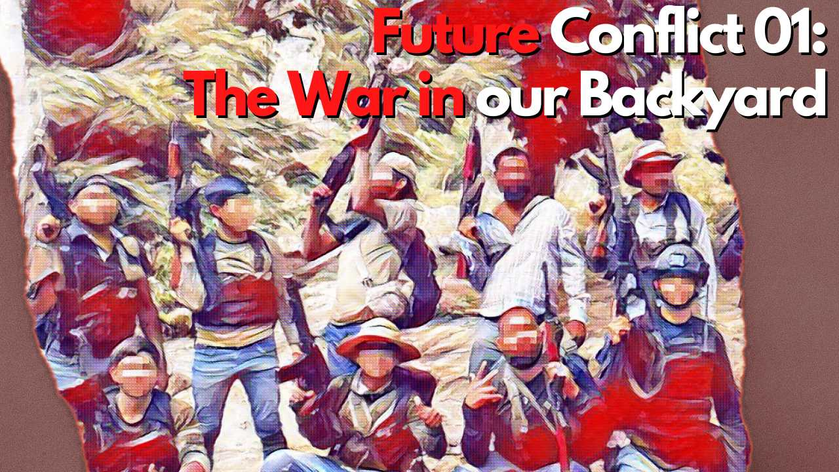Several days ago we spoke on the FUTURE CONFLICT Channel about the notion of limiting the franchise to those willing to serve their country in one of many possible ways
"Service Guarantees Citizenship" or SGC is a concept put forth by Robert A. Heinlein in his science fiction novel, Starship Troopers. This model of government ties citizenship to the military or other forms of service to the state. While it may seem controversial at first glance, there are several compelling arguments in favor of this system. It encourages civic engagement, instills a sense of duty and responsibility, and promotes a meritocratic society where those who have proven their worth through service are rewarded with the privileges of citizenship. However, there are also valid concerns about potential abuses of power, unequal representation, and the lack of diversity in perspectives and experiences within the political process. These criticisms are mostly a weak cry from the Diversity Equity and Inclusion crows but for the sake of argument I’ll address them in the spirit of “tolerance,” but first a word on democracy and its flaws.
Looking at Europe and even some of our recent elections both at the state several criticisms of an unlimited franchise come to mind such as a lack of expertise in decision-making (Fetterman or FJB comes to mind), the rise of demagogues who manipulate the public opinion and use inflammatory rhetoric to gain power, and a lack of accountability, where elected officials are more concerned with pleasing the masses than with making difficult but necessary decisions.
These criticisms of an unlimited franchise raise valid concerns about decision-making expertise, the rise of demagogues, and a lack of accountability. These issues can lead to a degradation of political discourse, short-term thinking, and prioritization of popularity over long-term success. However, the SGC model offers a solution to these problems by ensuring that citizens have a vested interest in the success of their country through their service. This can create a sense of responsibility and expertise among citizens and can promote a focus on substance and policy rather than emotional rhetoric. Additionally, a service-based model ensures that elected officials are held accountable to those who have served, rather than just those who hold the power of a vote.
SGC is a concept put forth by Robert A. Heinlein in his novel Starship Troopers. The idea proposes that in order to earn the right to vote and participate in the democratic process, one must first serve their country in a meaningful way, primarily in military service but also in other forms. Here I will examine the advantages of SGC, as well as address potential criticisms and provide counterarguments. Ultimately, this analysis will allow us to better understand the implications of this proposed system and its potential role in shaping a strong and responsible society.
Among the benefits of SGC is the Creation of a strong sense of national identity and loyalty, the promotion of civic engagement and responsibility, and the Development of valuable skills and experiences.
In Starship Troopers, Heinlein argues that the act of serving one's country through the military or other forms of service creates a strong sense of national identity and loyalty among citizens. According to him, this sense of national pride and belonging is essential for the survival and success of any nation. As one character in the book states, "A nation is a living organism, and it must have a soul as well as a body, or it will perish."
Heinlein also contends that SGC promotes civic engagement and responsibility among citizens. Through their service, individuals learn the value of teamwork, discipline, and sacrifice for the greater good. They also gain a deeper understanding of the workings of government and the importance of active participation in the political process. As Heinlein writes, "Citizenship is an attitude, a state of mind, an emotional conviction that the whole is greater than the part, and that the part should be humbly proud to sacrifice itself that the whole may live."
In addition to fostering national identity and civic responsibility, SGC offers individuals the opportunity to develop valuable skills and experiences that can benefit both themselves and society as a whole. For example, military service can provide training in leadership, strategic thinking, and technical expertise, while other forms of service can offer hands-on experience in fields such as education, healthcare, or environmental conservation. As Heinlein writes, "The best way to learn a trade is to practice it in a real-world setting. The best way to learn leadership is to lead real people in real situations."
While some may argue that requiring service obligations for citizenship may limit the diversity of perspectives and experiences represented in government and society, this can be mitigated by ensuring that there are no arbitrary barriers to service that could disproportionately exclude certain segments of the population based on factors such as race, gender, or socioeconomic status. Additionally, those who choose not to serve are not necessarily excluded from participating in other aspects of society and can still exercise their civil rights as civilians.
Opponents of service-guarantee citizenship may weakly argue that a limited franchise model could be open to abuse by those in power who could manipulate the requirements for service in order to limit political participation and suppress dissent. However, a system that includes a mandatory course on moral philosophy and civic responsibility could help prevent such abuse by ensuring that citizens have a clear understanding of their obligations to society and are able to think critically and independently.
Throughout history, there have been examples of limited franchise models that have been successful in creating stable and prosperous societies. For example, the ancient Greek city-state of Athens limited political participation to male citizens who had completed military training. This model helped to create a strong sense of civic responsibility and national identity, and Athenian democracy is still celebrated as a seminal moment in the development of Western political thought. Similarly, the early United States limited political participation to male property owners, which helped to ensure that only those who had a stake in society had a say in how it was governed. While these systems were not without their flaws, they demonstrate that limited franchise models can be effective in creating stable and prosperous societies.
While democracy is often praised for its ability to give power to the people, it has also been criticized throughout history for a variety of reasons. One of the main criticisms of universal democracy is that it can lead to the tyranny of the majority, where the majority imposes its will on the minority without regard for their rights or interests.
Service Guarantees Citizenship presents a unique and innovative approach to governance that has the potential to address many of the challenges facing modern democracies. While the universal franchise has its merits, it is not without its drawbacks, including a lack of expertise, the rise of demagogues, and a lack of accountability. By contrast, Service Guarantees Citizenship offers a way to foster a strong sense of national identity, promote civic engagement and responsibility, and develop valuable skills and experiences.
Of course, there are potential pitfalls to this model as well, including the risk of creating a privileged class of citizens and the potential for abuse by those in power. However, by carefully designing and implementing such a system, these risks can be mitigated and the benefits realized.
Ultimately, the concept of Service Guarantees Citizenship represents a new and promising direction for democratic governance, one that recognizes the importance of service and sacrifice in building a strong and vibrant society. By adopting this approach, we can create a political system that is truly of the people, by the people, and for the people, one that is capable of meeting the challenges of our time and building a brighter future for us all.



















